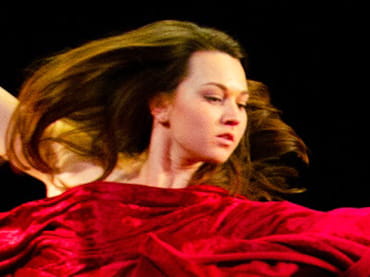The Challenge: Many Untreated Concussions
When Emma — an aspiring professional dancer — hit her head doing a backbend in July 2018, she never thought she'd suffered a concussion.
The 21-year-old from Ohio was a dance major and dean's list student at Hope College in Holland, Mich. She had been enjoying summer break before a busy junior year until that day in July.
“I had concussions before. One from a car wreck, another from playing softball, and even one from a mountain biking mishap. But none of them affected me the way this one did," she says.
Going back to Hope College a few weeks later, Emma resumed her demanding schedule of classes and dance.
Almost right sway, she started having unexplained:
- Dizzy spells
- Muscle tremors
- Bouts of complete exhaustion
- Panic attacks
She also felt overwhelmed by crowds and struggled to concentrate.
“A homework assignment that would before take only 20 minutes would take an hour to complete," she recalls.
Despite these challenges, she pushed to finish the fall semester.
It wasn't until she went home for winter break that she started searching for an answer to her symptoms.
Aware of Emma's issues — and knowing the family's history of epilepsy — her parents were highly concerned. They also observed that she was unusually emotional, tense, and irritable — signs that Emma herself did not notice.
“I had all these symptoms, but I was just living my life as always," she notes.
"Since they knew what exercises triggered my symptoms, those triggers were incorporated into my therapy to allow my brain to become desensitized to them." — Emma
The Path to the UPMC Sports Medicine Concussion Program
Emma later learned that concussion symptoms can be subtle and may not show up right after an injury.
“A full school schedule, especially my cardio training and dance classes, triggered my symptoms," she says.
Emma's father started thinking about what the next steps should be. A fan of NASCAR driver Dale Earnhardt, Jr., he thought of Michael “Micky" Collins, PhD, director of UPMC Sports Medicine's Concussion program.
Dr. Collins treated Dale's concussions from racing.
“My dad connected the concussion symptoms Dale wrote about in his book with what was happening to me," she says. “He suggested that we contact Dr. Collins."
In January 2019, Emma met with Dr. Collins and his team for a thorough concussion assessment.
“At that point, I wasn't sure I would ever get better," she says.
“After lots of tests to figure out what triggered my symptoms, Dr. Collins said, 'Yes, you have a concussion. And yes, we have the tools to fix it.' Hearing that 'yes' meant the world to me," Emma recalls.
The Solution: A Custom, Six-Week Treatment Plan
Dr. Collins and his team customized a six-week treatment plan designed to get Emma back to dancing. It included physical exertion and vestibular rehab to treat her injured brain.
“Since they knew what triggered my symptoms, they added those exercises into my therapy. This allowed my brain to become less sensitive to them," says Emma.
Driven to get back to her normal dancer life, Emma committed to her rehab. Three times a week, she did cardio with different turns and jumps to trigger dizziness.
“On Tuesdays and Thursdays, my therapists mixed it up by working my abs. They had me do mountain climbers and planks with head rotations," she says.
Emma also did a series of exercises twice a day to help reduce dizziness, unbalance, and other concussion symptoms.
Emma and her therapy team knew she also had to overcome her overwhelming unease of being in large crowds. Emma had plans for a dance internship in New York City during the fall 2019 semester.
“By putting myself into those places again and again, I was able to become desensitized," she says.
By late February, just six weeks after her first visit with Dr. Collins, Emma tested out of all her therapies. She also stopped the medicines she'd been taking.
The Results: Fulfilling Her Life's Dream
In July 2019, Emma finished an intensive, three-week professional dance training program in Maine.
In August, she moved to New York City for a semester-long dance internship. And she had classes with the Dance Lab New York and Paul Taylor Dance Company.
“I'm confident that I can do this internship without worrying about my concussion symptoms coming back," she says.
Emma shared that fulfilling this long-held dream is largely due to the care of Dr. Collins and her therapists at UPMC.
“They were all amazing," she adds. “I couldn't have asked for a better group of people around me."
Emma intends to keep up a regular exercise routine, including dance and cross-training, because “it helps keep [her] brain clear and focused."
"During this process, I've learned a lot of lessons — about myself, self-care, and asking others for help when I need it. And now, I'm ready to graduate and enter the real world," says Emma.

















